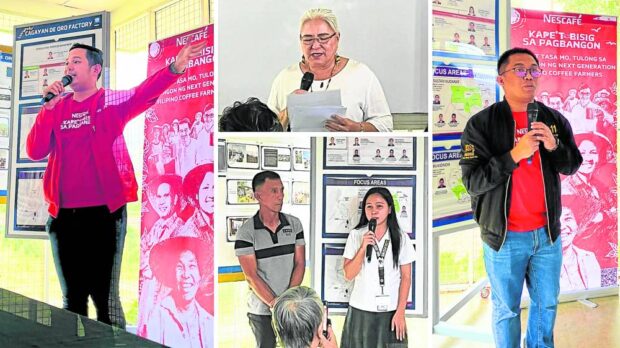TikTok harnessed as ‘recruitment’ tool

NURTURING THE FUTURE Nescafe launches Kape’t Bisig sa Pagbangon program to ignite in young people an interest in and enthusiasm for agriculture, particularly coffee growing. —photos from Nescafe
Nescafé is “recruiting.”
No, it is not hiring new employees. What Nescafé recently embarked on, in time for the global observance of International Coffee Day on Oct. 1 and International Coffee Month in October, is a program to encourage young people to go into coffee farming.
The leading coffee processor and distributor launched in Bukidnon—which is becoming the hub of coffee production in the Philippines—Kape’t Bisig sa Pagbangon, which aims to create in young people interest in and enthusiasm for agriculture, particularly coffee growing.
It wants to help build a new generation of farmers, agriculturists and rural development champions through a TikTok challenge that will carry positive content honoring farmers and highlighting the value of their work. Educational assistance worth P10 million will also be provided to children of coffee farmers in Mindanao.
The campaign on TikTok, the current preferred social platform of the young, will challenge so-called TikTokers to personalize the Kape’t Bisig sa Pagbangon song, putting their own spin on it. They can do rap, rock, hip hop, etc., and just let inspiration and their creative juices guide them.
Article continues after this advertisementAlthough the challenge is not a competition with prizes, they can expect a much bigger number of views of their uploaded, customized TikTok versions of the Kape’t Bisig theme song as Nescafé will share them on its own social media accounts.
Article continues after this advertisementThis latest phase in Nescafé’s efforts to support and raise the standard of living of coffee growers supplements and complements its other initiatives to help farmers significantly increase the yields of their farms through proven and sustainable agricultural methods and practices.
The company’s Nescafé Plan initiatives also seek to transform coffee growers into “agri-preneurs” so their livelihood can be more financially rewarding and fulfilling.
For Nescafé, helping farmers is not just altruism. It is also self-preservation.
After all, as the top user of locally produced coffee, it has to make sure supply is adequate and sustainable to meet its ever-growing requirements.
Arthur Baria, the head of agribusiness of Nestlé Philippines Inc., Nescafé’s mother company, said that, through the Integrated Coffee Center in Malaybalay, Bukidnon, growers were being taught different agricultural technologies, like genetics, good farming practices and processes.
Coffee production initiative
The center and its training programs are accredited by the Technical Education and Skills Development Authority.
Donnel Tiedra, Nestlé corporate affairs executive and agronomist, stressed the urgency of the situation as he pointed out that farmers were growing old “and their children are not interested in agriculture.” The young viewed farming as a lowly profession, burdened by poverty and heavy labor.
“We really need to change the mindset [of the young] and show the opportunities in farming,” he said.
The coffee production initiative, he added, was Nestle’s longest-running farmers’ support program. The company wanted to show beneficiaries coffee production was not just about farming but also a business so they were being trained in entrepreneurship and management.
Arnold Abear, one of the farmer beneficiaries, said his yield had increased through “regenerative agriculture” he learned from the program. Abear, born and raised on a coffee farm, said his goals were simple—provide for the needs of his family and allow his children to study, preferably learn about his livelihood “so when they return, they would know something” about coffee farming.
Queen Queen Subasco, whose father Rolly is a coffee grower in Sultan Kudarat, is among the young people who now see a future in the family’s traditional source of income. A beneficiary of the Kape’t Bisig educational assistance at the Sultan Kudarat State University (SKSU), she said she decided to take up agriculture “to show there was a future in it and many opportunities.”
Aside from SKSU, Kape’t Bisig has also partnered with the University of Southern Mindanao and Central Mindanao University. The partner schools will identify prospective beneficiaries, with priority given to children of farmers in agriculture-related courses.
Sectoral collaboration
Kape’t Bisig will grant 400 students P25,000 each for their academic requirements.
Mindanao, through smallholder farmers in Bukidnon and Sultan Kudarat, now produces and grows 83.63 percent of the country’s coffee.
But the average age of Filipino farmers is 57 to 59 years old and interest in agriculture is dropping among the young. A critical shortage of coffee farmers in 10 to 15 years will increase the country’s dependence on imports.
In a message for the launch of Kape’t Bisig, Regional Director Carlene Collado of the Department of Agriculture (DA) Region 10 said the government agency recognized coffee “as one of the top five high-value crops” in the country. The DA, she said, had its own scholarship program to encourage young people to go into agriculture.
The director’s speech was read by Carlota Madriaga, regional technical director for operations of the DA.
The Nescafé Plan,with its focus on regenerative agriculture, helps farmers prepare the soil for a more bountiful and profitable coffee harvests far into the future.
The decades-old multisectoral collaboration and meaningful interventions have helped increase participating coffee farmers’ yields and profits by 300 percent.
Its banner initiative, Project Coffee+, with the German development agency GIZ, has introduced 1,500 farmers to regenerative agriculture and entrepreneurship. Some 86 percent of these farmers have since crossed the poverty threshold. —Contributed INQ